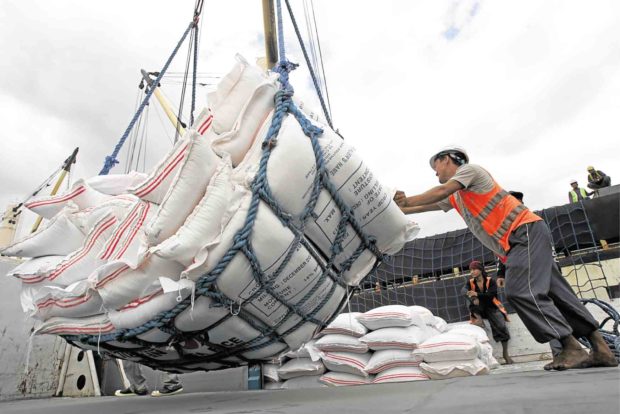
Workers at the Manila Harbour Center unload rice that the National Food Authority bought from Vietnam in the aftermath of Supertyphoon Yolanda. (INQUIRER FILE PHOTO)
MANILA, Philippines — Agriculture officials are “almost done” with the working draft of the country’s proposed five-year rice trade agreement with Vietnam, which they hope will be signed during President Marcos’ state visit to Hanoi later this month.
Department of Agriculture (DA) Secretary Francisco Tiu Laurel Jr. gave the assurance on Tuesday following his meeting with the President.
“We were given instructions by the President [in December] to draft and finalize the memorandum of agreement with Vietnam so that it can be signed when he goes on a state visit to Vietnam by the end of January. We have the working draft; it’s almost done,” he said during a briefing in Malacañang.
Mr. Marcos will visit the Vietnamese capital on a three-day state from Jan. 29 to Jan. 31 to meet with Vietnamese President Vo Van Thuong and boost bilateral ties between their countries.
Manila and Hanoi have agreed to finalize a rice trade agreement involving Vietnam exporting rice to the Philippines to ensure its neighbor’s food security.
Rice supply guarantee
Asked for details on the rice trade deal, Laurel said: “Basically, it guarantees that they will supply rice to us even in calamity situations. That is part of our food safety. That is good for us.”
The agriculture secretary also assured the public of a sufficient rice supply based on inventories made in December and early this month.
Laurel said the Philippines recorded an ending rice stock of 20 million tons at the end of last year, and it was eyeing a similar volume for 2024 in preparation for El Niño, a climate pattern associated with warmer and drier conditions.
“As far as supply is concerned, we have enough supply of rice. We have healthy stocks of rice for December and January, and there’s additional rice coming. But prices are hard to predict because world prices of rice are going up because of El Niño,” he added.